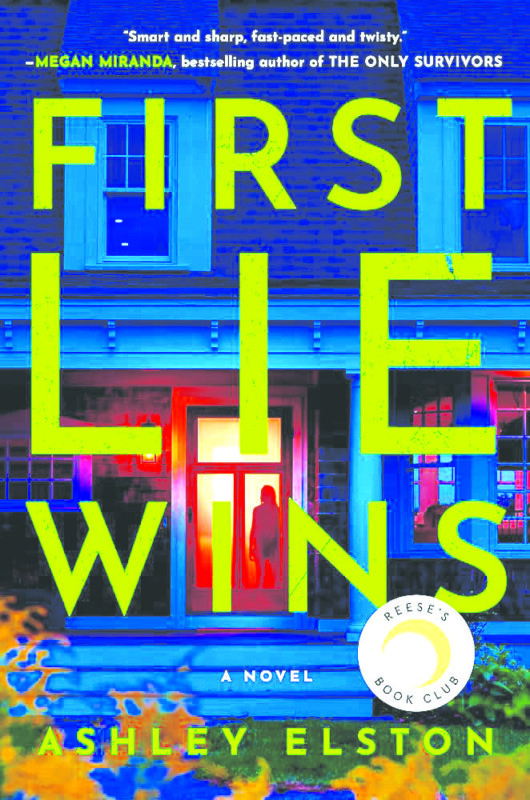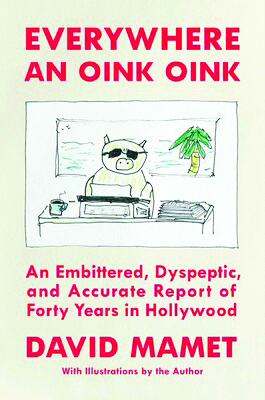How far will you read into a book if you don’t like the protagonist? With her first novel directed toward adults, Ashley Elston is betting that we will keep reading so long as she provides little surprises around every corner, like Willy Wonka.
The formula seems to be working. The book was the January pick for Reese Witherspoon’s book club and has garnered praise as a suspenseful thriller. To which I say meh. Not that First Lie Wins doesn’t throw out many curve balls — it does. And an author’s ability to craft a didn’t-see-that-coming ending after multiple didn’t-see-that-coming chapters is rightly valued in a day when the storylines of much popular fiction are painfully predictable. That said, it’s nice to genuinely like at least somebody in a 300-page book.
We are supposed to kind-of, sort-of like the protagonist, initially introduced as Evie Porter, although we soon learn that Evie Porter is the latest in a long line of aliases. When we meet Evie she is suffering through a dinner in which she is meeting, for the first time, her boyfriend’s circle of friends — people who grew up much differently than she did.
“They are the ones who started kindergarten together, their circle remaining small until high school graduation. They fled town in groups of twos and threes to attend a handful of colleges all within driving distance of here. They all joined sororities and fraternities with other groups of twos and threes with similar backgrounds, only to gravitate back to this small Louisiana town, the circle closing once again.”
Evie, on the other hand, is a loner with a much different lineage. She’d grown up in a small town in North Carolina, an only child who lived with her single mom in a trailer. It was a wholesome enough environment — lots of love and dreams — until her mom got sick, and Evie started stealing jewelry from rich people at age 17 to help pay for her mother’s cancer treatment. (Which is why we’re supposed to kind-of, sort-of like her.) Her criminal skills landed her even more lucrative work as an operative for a shadowy criminal enterprise run by a mysterious Mr. Smith. She goes from job to job, always assuming a new identity that has been meticulously set up for her, in order to achieve some nefarious goal for her employer. Although she is described at one point as “morally gray,” it’s a dark shade of gray.
Evie’s latest job is to infiltrate the life of Ryan Sumner, an affable frat-boy-turned-businessman who inherited his grandfather’s house and business and is happily living as a bachelor in a a leafy suburb in Louisiana, a place where there’s a lot of money “but it’s the quiet kind.”
An attractive woman, Evie inserts herself into Ryan’s life with remarkable ease, setting up a “chance” meeting by having a flat tire at a gas station that she knows he visits every Thursday. She wears a short skirt, her intelligence having gathered knowledge that “his eyes almost always lingered too long on any female who crossed his path, especially those dressed in short skirts.”
There is much suspension of disbelief required here and throughout the book — that this single encounter leads to Evie’s moving in with Ryan a few months later, that this bachelor with a roving eye is suddenly ready for a long-term relationship — but OK. Again, surprises around every corner, and Elston has elegantly plotted this story, showing us snapshots of Evie’s other lives in flashbacks even as she easily settles into domestic bliss with Ryan. There are shades of the movie Pretty Woman, especially when Evie dons a big hat to wear to a Kentucky Derby party.
But things take a turn when an old friend of Ryan’s shows up at the party with a woman who looks astonishingly similar to Evie on his arm. Soon there’s another big reveal that will be the hook that drags us, however unwillingly, through the rest of the book. Evie, it turns out, is not the only person presenting herself as someone she’s not. And her unscrupulous employer has grown suspicious of her loyalty and has set out to test her, even as she tries to follow through with her “long con” of Ryan, while growing comfortable in the happy-couple-in-the-’burbs life.
Meanwhile, a fatal accident involving people in the couple’s circle leads to a police investigation that calls Evie’s background into question and the story shifts to a murder investigation in another state that one of Evie’s alter egos may or may not have been involved in. And we become aware that Evie is not a helpless pawn entrapped by a criminal mastermind, but that she has developed her own protective network, including an IT genius who’d entered MIT at age 17 but dropped out because he was bored and realized “the most profitable work isn’t always legal.”
Despite Elston’s efforts to paint her as a “good” criminal, there is little reflection — for either Evie or the reader — of the moral issues involved. She’s Walter White-like in this way: if a cancer diagnosis is involved when someone starts to break bad, we’re supposed to look the other way. And as in the Breaking Bad universe, there are plenty of other “morally gray” people in the cast of First Lie Wins. (And there will be a cast: the film rights have already been acquired.)
A little sober reflection of the moral issues involved — some Tony Soprano on the therapist’s couch — would have added complexity to the story, but slowed the pace — the story races to an every-mystery-resolved finish that is both a perfect Hollywood ending and an opportunity for countless sequels. Evie Porter will be with us for a while, I predict. Whether we like her or not.
B- —Jennifer Graham






